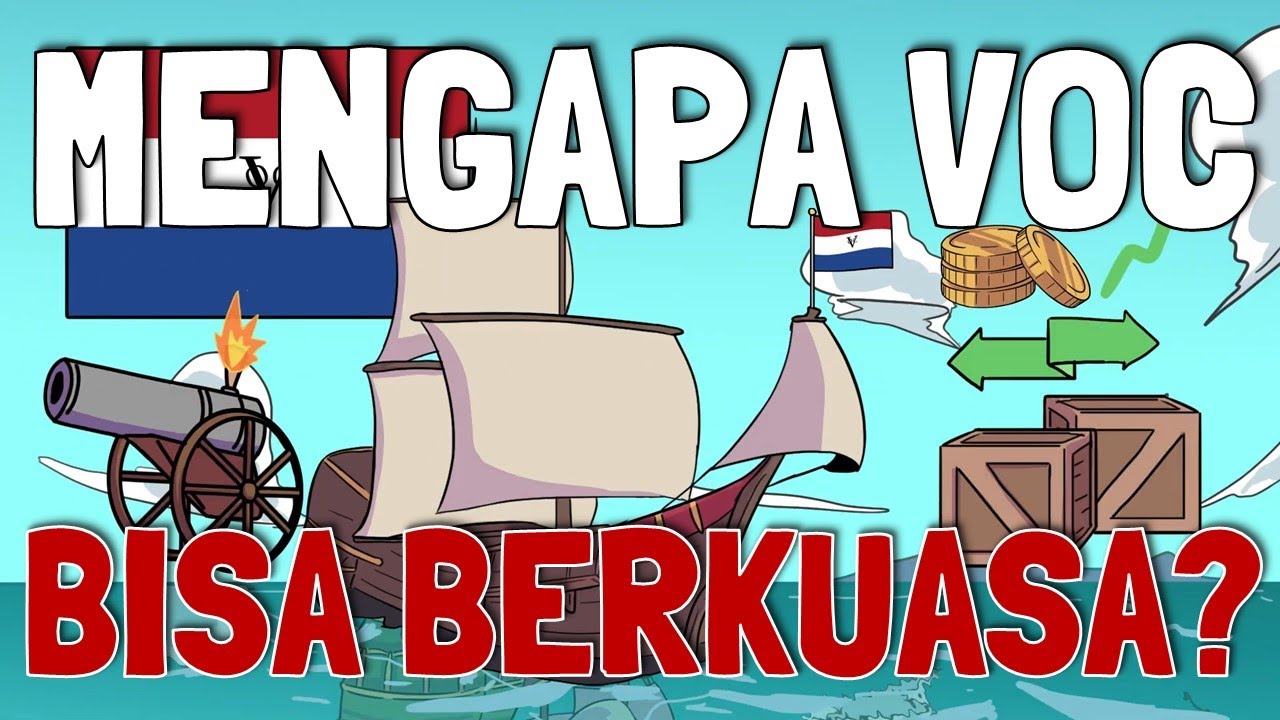SEJARAH BERDIRINYA VOC
Summary
TLDRThe video script delves into the historical establishment of the Dutch East India Company, known as the VOC, which once dominated trade in the Indonesian archipelago. It discusses the company's formation in 1602 through the merger of six Dutch trading companies, aiming to monopolize the lucrative spice trade in Asia. The VOC was granted extraordinary privileges by the Dutch government, functioning almost as a state within a state, with its own army, currency, and the power to levy taxes and conduct diplomacy. This enabled the company to amass immense wealth, equivalent to hundreds of quadrillions of rupiahs in today's terms, and maintain its influence for nearly two centuries.
Takeaways
- 🏛️ The Dutch East India Company (VOC) was a powerful trading company that once colonized various regions in Indonesia.
- 🌍 The term 'compagnie' or 'compeni', often heard today, originates from the Dutch traders who were called 'Compagnie' during the colonial era.
- 🚢 The Dutch voyages to the East Indies in 1596 opened up new trade routes, leading to an influx of valuable spices to the Netherlands.
- 🤝 The VOC was established on March 20, 1602, as a merger of six smaller Dutch trading companies to consolidate power and counter competition from other European traders.
- 💡 The primary goal of the VOC was to monopolize the spice trade in Asia, as spices were extremely valuable commodities at the time.
- 💼 The VOC implemented a shareholding system, allowing anyone to own shares and even employees to be shareholders, with the largest shareholder being a Belgian investor.
- 👥 The 'Heeren XVII', a council of 17 members from six Dutch provinces, was the governing body of the VOC, controlling operations from Amsterdam.
- 👑 The VOC was granted special rights by the Dutch government, effectively acting as an extension of Dutch governance in Asia, including the power to wage war, mint money, and negotiate treaties.
- 💰 The VOC was extremely profitable, generating revenues in the millions of guilders, which would be equivalent to hundreds of quadrillions of rupiah today.
- 📜 Communication with VOC's Asian operations was challenging due to the lack of modern technology, relying on letters and sea routes.
- 🌐 The VOC's influence was so significant that it was considered a 'state within a state', despite being a trading company.
Q & A
What is the historical significance of the Dutch East India Company (VOC) in Indonesia?
-The Dutch East India Company (VOC) played a significant role in the history of Indonesia as it was a major trading company that colonized various regions of Indonesia and had a monopoly on the spice trade in Asia.
What does 'VOC' stand for in the context of the script?
-In the script, 'VOC' stands for 'Vereenigde Oostindische Compagnie', which translates to the 'United East India Company' in English.
How did the VOC's establishment come about?
-The VOC was established as a result of negotiations and the influence of Prince Maurits, who brought together six competing Dutch trading companies to form a single entity to consolidate power and counter external threats from other European powers.
What were the main objectives of the VOC's formation?
-The main objectives of the VOC's formation were to monopolize the spice trade in Asia, gain financial independence from Spain, and strengthen the Dutch position in Asia against other European traders.
Why were spices so valuable during the VOC's time?
-Spices were extremely valuable during the VOC's time because they were considered high-value goods, even more so than gold, and were essential for the Dutch economy.
What was the role of the 'Heeren XVII' in the VOC?
-The 'Heeren XVII', or the Council of Seventeen, was the highest governing body of the VOC, consisting of 17 members from six Dutch provinces, and they were responsible for controlling the company's operations in Asia from Amsterdam.
How did the VOC's governance structure facilitate its operations?
-The VOC's governance structure, with the Heeren XVII in Amsterdam and the appointment of a Governor-General in Asia, allowed for effective control and management of the company's vast operations despite the long distances and communication challenges of the time.
What were the special privileges granted to the VOC by the Dutch government?
-The Dutch government granted the VOC special privileges, including the right to monopolize trade, maintain its own army, issue currency, levy taxes, administer justice, negotiate with local rulers, and even declare war.
How did the VOC's status as a 'state within a state' affect its operations?
-Being a 'state within a state', the VOC had the authority similar to a nation, which allowed it to exert significant control over the regions it operated in, despite being a trading company.
What was the VOC's economic impact during its operation?
-The VOC had a substantial economic impact, generating immense profits, which, if converted to the current Indonesian currency, would equate to hundreds of quadrillions of rupiah.
What was the significance of the Governor-General's role in the VOC?
-The Governor-General was the highest leader in the colonial territories, appointed to oversee the VOC's operations in Asia, which helped to manage the company more effectively due to the long distances from Amsterdam.
Outlines

此内容仅限付费用户访问。 请升级后访问。
立即升级Mindmap

此内容仅限付费用户访问。 请升级后访问。
立即升级Keywords

此内容仅限付费用户访问。 请升级后访问。
立即升级Highlights

此内容仅限付费用户访问。 请升级后访问。
立即升级Transcripts

此内容仅限付费用户访问。 请升级后访问。
立即升级浏览更多相关视频

Sejarah VOC di Indonesia dan Beberapa Perjanjianya

Perebutan Hegemoni di Indonesia oleh Bangsa Eropa

Mengapa VOC Belanda Bisa Menjajah Nusantara? & Mengapa Akhirnya Runtuh?

Kebijakan Gubernur Jendral VOC 1 ( Pieter Both )

PENGARUH MONOPOLI DALAM PERDAGANGAN

Perlawanan Bangsa Indonesia terhadap Penjajah Bangsa Eropa hingga awal abad 20 SEJARAH kelas 11
5.0 / 5 (0 votes)
